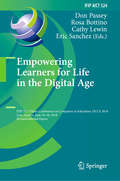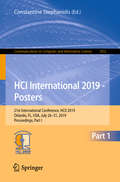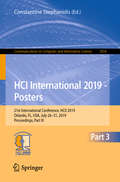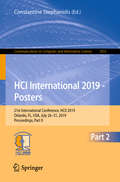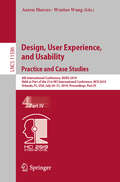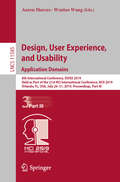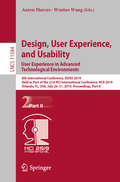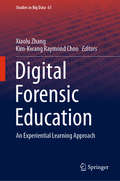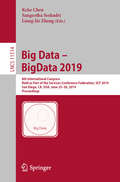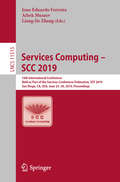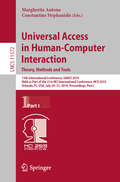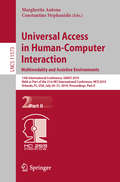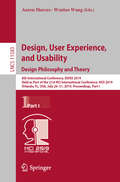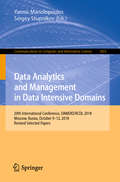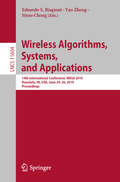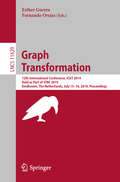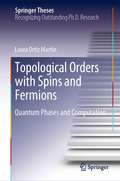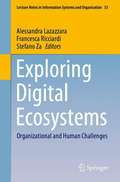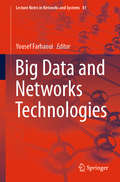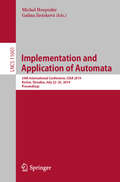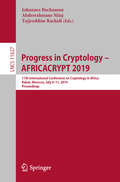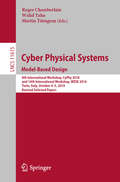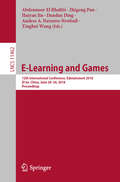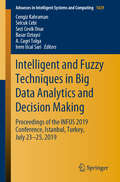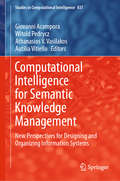- Table View
- List View
Empowering Learners for Life in the Digital Age: IFIP TC 3 Open Conference on Computers in Education, OCCE 2018, Linz, Austria, June 24–28, 2018, Revised Selected Papers (IFIP Advances in Information and Communication Technology #524)
by Don Passey Rosa Bottino Cathy Lewin Eric SanchezThis book constitutes the refereed post-conference proceedings of the IFIP TC 3 Open Conference on Computers in Education, OCCE 2018, held in Linz, Austria, in June 2018.The 24 revised full papers and 3 short papers included in this volume were carefully reviewed and selected from 63 submissions during two rounds of reviewing. The papers discuss key emerging topics and evolving practices in the area of educational computing research. They are organized in the following topical sections: computational thinking; programming and computer science education; teachers’ education and professional development; games-based learning and gamification; learning in specific and disciplinary contexts; learning in social networking environments; and self-assessment, e-assessment and e-examinations.
HCI International 2019 - Posters: 21st International Conference, HCII 2019, Orlando, FL, USA, July 26–31, 2019, Proceedings, Part I (Communications in Computer and Information Science #1032)
by Constantine StephanidisThe three-volume set CCIS 1032, CCIS 1033, and CCIS 1034 contains the extended abstracts of the posters presented during the 21st International Conference on Human-Computer Interaction, HCII 2019, which took place in Orlando, Florida, in July 2019.The total of 1274 papers and 209 posters included in the 35 HCII 2019 proceedings volumes was carefully reviewed and selected from 5029 submissions.The 208 papers presented in these three volumes are organized in topical sections as follows: Part I: design, development and evaluation methods and technique; multimodal Interaction; security and trust; accessibility and universal access; design and user experience case studies. Part II:interacting with games; human robot interaction; AI and machine learning in HCI; physiological measuring; object, motion and activity recognition; virtual and augmented reality; intelligent interactive environments. Part III: new trends in social media; HCI in business; learning technologies; HCI in transport and autonomous driving; HCI for health and well-being.
HCI International 2019 - Posters: 21st International Conference, HCII 2019, Orlando, FL, USA, July 26–31, 2019, Proceedings, Part III (Communications in Computer and Information Science #1034)
by Constantine StephanidisThe three-volume set CCIS 1032, CCIS 1033, and CCIS 1034 contains the extended abstracts of the posters presented during the 21st International Conference on Human-Computer Interaction, HCII 2019, which took place in Orlando, Florida, in July 2019.The total of 1274 papers and 209 posters included in the 35 HCII 2019 proceedings volumes was carefully reviewed and selected from 5029 submissions.The 208 papers presented in these three volumes are organized in topical sections as follows: Part I: design, development and evaluation methods and technique; multimodal Interaction; security and trust; accessibility and universal access; design and user experience case studies. Part II:interacting with games; human robot interaction; AI and machine learning in HCI; physiological measuring; object, motion and activity recognition; virtual and augmented reality; intelligent interactive environments. Part III: new trends in social media; HCI in business; learning technologies; HCI in transport and autonomous driving; HCI for health and well-being.
HCI International 2019 - Posters: 21st International Conference, HCII 2019, Orlando, FL, USA, July 26–31, 2019, Proceedings, Part II (Communications in Computer and Information Science #1033)
by Constantine StephanidisThe three-volume set CCIS 1032, CCIS 1033, and CCIS 1034 contains the extended abstracts of the posters presented during the 21st International Conference on Human-Computer Interaction, HCII 2019, which took place in Orlando, Florida, in July 2019.The total of 1274 papers and 209 posters included in the 35 HCII 2019 proceedings volumes was carefully reviewed and selected from 5029 submissions.The 208 papers presented in these three volumes are organized in topical sections as follows: Part I: design, development and evaluation methods and technique; multimodal Interaction; security and trust; accessibility and universal access; design and user experience case studies. Part II:interacting with games; human robot interaction; AI and machine learning in HCI; physiological measuring; object, motion and activity recognition; virtual and augmented reality; intelligent interactive environments. Part III: new trends in social media; HCI in business; learning technologies; HCI in transport and autonomous driving; HCI for health and well-being.
Design, User Experience, and Usability. Practice and Case Studies: 8th International Conference, DUXU 2019, Held as Part of the 21st HCI International Conference, HCII 2019, Orlando, FL, USA, July 26–31, 2019, Proceedings, Part IV (Lecture Notes in Computer Science #11586)
by Aaron Marcus Wentao WangThe four-volume set LNCS 11583, 11584, 11585, and 11586 constitutes the proceedings of the 8th International Conference on Design, User Experience, and Usability, DUXU 2019, held as part of the 21st International Conference, HCI International 2019, which took place in Orlando, FL, USA, in July 2019.The total of 1274 papers and 209 posters included in the 35 HCII 2019 proceedings volumes was carefully reviewed and selected from 5029 submissions.DUXU 2019 includes a total of 167 regular papers, organized in the following topical sections: design philosophy; design theories, methods, and tools; user requirements, preferences emotions and personality; visual DUXU; DUXU for novel interaction techniques and devices; DUXU and robots; DUXU for AI and AI for DUXU; dialogue, narrative, storytelling; DUXU for automated driving, transport, sustainability and smart cities; DUXU for cultural heritage; DUXU for well-being; DUXU for learning; user experience evaluation methods and tools; DUXU practice; DUXU case studies.
Design, User Experience, and Usability. Application Domains: 8th International Conference, DUXU 2019, Held as Part of the 21st HCI International Conference, HCII 2019, Orlando, FL, USA, July 26–31, 2019, Proceedings, Part III (Lecture Notes in Computer Science #11585)
by Aaron Marcus Wentao WangThe four-volume set LNCS 11583, 11584, 11585, and 11586 constitutes the proceedings of the 8th International Conference on Design, User Experience, and Usability, DUXU 2019, held as part of the 21st International Conference, HCI International 2019, which took place in Orlando, FL, USA, in July 2019.The total of 1274 papers and 209 posters included in the 35 HCII 2019 proceedings volumes was carefully reviewed and selected from 5029 submissions.DUXU 2019 includes a total of 167 regular papers, organized in the following topical sections: design philosophy; design theories, methods, and tools; user requirements, preferences emotions and personality; visual DUXU; DUXU for novel interaction techniques and devices; DUXU and robots; DUXU for AI and AI for DUXU; dialogue, narrative, storytelling; DUXU for automated driving, transport, sustainability and smart cities; DUXU for cultural heritage; DUXU for well-being; DUXU for learning; user experience evaluation methods and tools; DUXU practice; DUXU case studies.
Design, User Experience, and Usability. User Experience in Advanced Technological Environments: 8th International Conference, DUXU 2019, Held as Part of the 21st HCI International Conference, HCII 2019, Orlando, FL, USA, July 26–31, 2019, Proceedings, Part II (Lecture Notes in Computer Science #11584)
by Aaron Marcus Wentao WangThe four-volume set LNCS 11583, 11584, 11585, and 11586 constitutes the proceedings of the 8th International Conference on Design, User Experience, and Usability, DUXU 2019, held as part of the 21st International Conference, HCI International 2019, which took place in Orlando, FL, USA, in July 2019.The total of 1274 papers and 209 posters included in the 35 HCII 2019 proceedings volumes was carefully reviewed and selected from 5029 submissions.DUXU 2019 includes a total of 167 regular papers, organized in the following topical sections: design philosophy; design theories, methods, and tools; user requirements, preferences emotions and personality; visual DUXU; DUXU for novel interaction techniques and devices; DUXU and robots; DUXU for AI and AI for DUXU; dialogue, narrative, storytelling; DUXU for automated driving, transport, sustainability and smart cities; DUXU for cultural heritage; DUXU for well-being; DUXU for learning; user experience evaluation methods and tools; DUXU practice; DUXU case studies.
Digital Forensic Education: An Experiential Learning Approach (Studies in Big Data #61)
by Xiaolu Zhang Kim-Kwang Raymond ChooIn this book, the editors explain how students enrolled in two digital forensic courses at their institution are exposed to experiential learning opportunities, where the students acquire the knowledge and skills of the subject-matter while also learning how to adapt to the ever-changing digital forensic landscape. Their findings (e.g., forensic examination of different IoT devices) are also presented in the book. Digital forensics is a topic of increasing importance as our society becomes “smarter” with more of the “things” around us been internet- and inter-connected (e.g., Internet of Things (IoT) and smart home devices); thus, the increasing likelihood that we will need to acquire data from these things in a forensically sound manner. This book is of interest to both digital forensic educators and digital forensic practitioners, as well as students seeking to learn about digital forensics.
Big Data – BigData 2019: 8th International Congress, Held as Part of the Services Conference Federation, SCF 2019, San Diego, CA, USA, June 25–30, 2019, Proceedings (Lecture Notes in Computer Science #11514)
by Keke Chen Sangeetha Seshadri Liang-Jie ZhangThis volume constitutes the proceedings of the 8th International Congress on BIGDATA 2019, held as Part of SCF 2019 in San Diego, CA, USA in June 2019. The 9 full papers presented in this volume were carefully reviewed and selected from 14 submissions. They cover topics such as: Big Data Models and Algorithms; Big Data Architectures; Big Data Management; Big Data Protection, Integrity and Privacy; Security Applications of Big Data; Big Data Search and Mining; Big Data for Enterprise, Government and Society.
Services Computing – SCC 2019: 16th International Conference, Held as Part of the Services Conference Federation, SCF 2019, San Diego, CA, USA, June 25–30, 2019, Proceedings (Lecture Notes in Computer Science #11515)
by Joao Eduardo Ferreira Aibek Musaev Liang-Jie ZhangThis volume constitutes the proceedings of the 16th International Conference on Services Computing 2019, held as Part of SCF 2019 in San Diego, CA, USA in June 2019. The 9 full papers presented in this volume were carefully reviewed and selected from 15 submissions. They cover topics such as: foundations of services computing; scientific workflows; business process integration and management; microservices; modeling of services systems; service security and privacy; SOA service applications; and service lifecycle management.
Universal Access in Human-Computer Interaction. Theory, Methods and Tools: 13th International Conference, UAHCI 2019, Held as Part of the 21st HCI International Conference, HCII 2019, Orlando, FL, USA, July 26–31, 2019, Proceedings, Part I (Lecture Notes in Computer Science #11572)
by Margherita Antona Constantine StephanidisThis two-volume set constitutes the proceedings of the 13th International Conference on Universal Access in Human-Computer Interaction, UAHCI 2019, held as part of the 21st International Conference, HCI International 2019, which took place in Orlando, FL, USA, in July 2019. The total of 1274 papers and 209 posters included in the 35 HCII 2019 proceedings volumes was carefully reviewed and selected from 5029 submissions. UAHCI 2019 includes a total of 95 regular papers; they were organized in topical sections named: universal access theory, methods and tools; novel approaches to accessibility; universal access to learning and education; virtual and augmented reality in universal access; cognitive and learning disabilities; multimodal interaction; and assistive environments.
Universal Access in Human-Computer Interaction. Multimodality and Assistive Environments: 13th International Conference, UAHCI 2019, Held as Part of the 21st HCI International Conference, HCII 2019, Orlando, FL, USA, July 26–31, 2019, Proceedings, Part II (Lecture Notes in Computer Science #11573)
by Margherita Antona Constantine StephanidisThis two-volume set constitutes the proceedings of the 13th International Conference on Universal Access in Human-Computer Interaction, UAHCI 2019, held as part of the 21st International Conference, HCI International 2019, which took place in Orlando, FL, USA, in July 2019.The total of 1274 papers and 209 posters included in the 35 HCII 2019 proceedings volumes was carefully reviewed and selected from 5029 submissions.UAHCI 2019 includes a total of 95 regular papers; they were organized in topical sections named: universal access theory, methods and tools; novel approaches to accessibility; universal access to learning and education; virtual and augmented reality in universal access; cognitive and learning disabilities; multimodal interaction; and assistive environments.
Design, User Experience, and Usability. Design Philosophy and Theory: 8th International Conference, DUXU 2019, Held as Part of the 21st HCI International Conference, HCII 2019, Orlando, FL, USA, July 26–31, 2019, Proceedings, Part I (Lecture Notes in Computer Science #11583)
by Aaron Marcus Wentao WangThe four-volume set LNCS 11583, 11584, 11585, and 11586 constitutes the proceedings of the 8th International Conference on Design, User Experience, and Usability, DUXU 2019, held as part of the 21st International Conference, HCI International 2019, which took place in Orlando, FL, USA, in July 2019.The total of 1274 papers and 209 posters included in the 35 HCII 2019 proceedings volumes was carefully reviewed and selected from 5029 submissions.DUXU 2019 includes a total of 167 regular papers, organized in the following topical sections: design philosophy; design theories, methods, and tools; user requirements, preferences emotions and personality; visual DUXU; DUXU for novel interaction techniques and devices; DUXU and robots; DUXU for AI and AI for DUXU; dialogue, narrative, storytelling; DUXU for automated driving, transport, sustainability and smart cities; DUXU for cultural heritage; DUXU for well-being; DUXU for learning; user experience evaluation methods and tools; DUXU practice; DUXU case studies.
Data Analytics and Management in Data Intensive Domains: 20th International Conference, DAMDID/RCDL 2018, Moscow, Russia, October 9–12, 2018, Revised Selected Papers (Communications in Computer and Information Science #1003)
by Yannis Manolopoulos Sergey StupnikovThis book constitutes the refereed proceedings of the 20th International Conference on Data Analytics and Management in Data Intensive Domains, DAMDID/RCDL 2018, held in Moscow, Russia, in October 2018.The 9 revised full papers presented together with three invited papers were carefully reviewed and selected from 54 submissions. The papers are organized in the following topical sections: FAIR data infrastructures, interoperability and reuse; knowledge representation; data models; data analysis in astronomy; text search and processing; distributed computing; information extraction from text.
Wireless Algorithms, Systems, and Applications: 14th International Conference, WASA 2019, Honolulu, HI, USA, June 24–26, 2019, Proceedings (Lecture Notes in Computer Science #11604)
by Edoardo S. Biagioni Yao Zheng Siyao ChengThis book constitutes the proceedings of the 14th International Conference on Wireless Algorithms, Systems, and Applications, WASA 2019, held in Honolulu, HI, USA, in June 2019. The 43 full and 11 short papers presented were carefully reviewed and selected from 143 submissions. The papers deal with new ideas and recent advances in computer systems, wireless networks, distributed applications, and advanced algorithms that are pushing forward the new technologies for better information sharing, computer communication, and universal connected devices in various environments, especially in wireless networks.
Graph Transformation: 12th International Conference, ICGT 2019, Held as Part of STAF 2019, Eindhoven, The Netherlands, July 15–16, 2019, Proceedings (Lecture Notes in Computer Science #11629)
by Esther Guerra Fernando OrejasThis book constitutes the refereed proceedings of the 12th International Conference on Graph Transformation, ICGT 2019, held as part of STAF 2019, in Eindhoven, The Netherlands, in July2019. The 12 research papers and 1 tool paper presented in this book were carefully reviewed and selected from 22 submissions. The papers deal with the following topics: Theory, Analysis and Verification, Tools and Applications, and Transformation Rules Construction and Matching.
Topological Orders with Spins and Fermions: Quantum Phases and Computation (Springer Theses)
by Laura Ortiz MartínThis thesis deals with topological orders from two different perspectives: from a condensed matter point of view, where topological orders are considered as breakthrough phases of matter; and from the emerging realm of quantum computation, where topological quantum codes are considered the most appealing platform against decoherence. The thesis reports remarkable studies from both sides. It thoroughly investigates a topological order called the double semion model, a counterpart of the Kitaev model but exhibiting richer quasiparticles as excitations. A new model for symmetry enriched topological order is constructed, which adds an onsite global symmetry to the double semion model. Using this topological phase, a new example of topological code is developed, the semion code, which is non-CSS, additive, non-Pauli and within the stabiliser formalism.Furthermore, the thesis analyses the Rashba spin-orbit coupling within topological insulators, turning the helical edge states into generic edges modes with potential application in spinstronics. New types of topological superconductors are proposed and the novel properties of the correspondingly created Majorana fermions are investigated. These Majorana fermions have inherent properties enabling braiding and the performance of logical gates as fundamental blocks for a universsal quantum computator.
Exploring Digital Ecosystems: Organizational and Human Challenges (Lecture Notes in Information Systems and Organisation #33)
by Francesca Ricciardi Stefano Za Alessandra LazazzaraThe recent surge of interest in digital ecosystems is not only transforming the business landscape, but also poses several human and organizational challenges. Due to the pervasive effects of the transformation on firms and societies alike, both scholars and practitioners are interested in understanding the key mechanisms behind digital ecosystems, their emergence and evolution. In order to disentangle such factors, this book presents a collection of research papers focusing on the relationship between technologies (e.g. digital platforms, AI, infrastructure) and behaviours (e.g. digital learning, knowledge sharing, decision-making). Moreover, it provides critical insights into how digital ecosystems can shape value creation and benefit various stakeholders. The plurality of perspectives offered makes the book particularly relevant for users, companies, scientists and governments. The content is based on a selection of the best papers – original double-blind peer-reviewed contributions – presented at the annual conference of the Italian chapter of the AIS, which took place in Pavia, Italy in October 2018.
Big Data and Networks Technologies (Lecture Notes in Networks and Systems #81)
by Yousef FarhaouiThis book reviews the state of the art in big data analysis and networks technologies. It addresses a range of issues that pertain to: signal processing, probability models, machine learning, data mining, databases, data engineering, pattern recognition, visualization, predictive analytics, data warehousing, data compression, computer programming, smart cities, networks technologies, etc. Data is becoming an increasingly decisive resource in modern societies, economies, and governmental organizations. In turn, data science inspires novel techniques and theories drawn from mathematics, statistics, information theory, computer science, and the social sciences. All papers presented here are the product of extensive field research involving applications and techniques related to data analysis in general, and to big data and networks technologies in particular. Given its scope, the book will appeal to advanced undergraduate and graduate students, postdoctoral researchers, lecturers and industrial researchers, as well general readers interested in big data analysis and networks technologies.
Implementation and Application of Automata: 24th International Conference, CIAA 2019, Košice, Slovakia, July 22–25, 2019, Proceedings (Lecture Notes in Computer Science #11601)
by Michal Hospodár Galina JiráskováThis book constitutes the proceedings of the 24th International Conference on Implementation and Application of Automata, CIAA 2019, held in Kosice, Slovakia, in July 2019.The 17 regular papers presented together with 2 invited papers in this book were carefully reviewed and selected from 29 initial submissions. The topics of the papers include complexity of languages and language operations, regular expressions, picture languages, jumping automata, input driven and two-dimensional automata, tree languages and tree transducers, architecture of oritatami systems, intruder deduction problem, context sensitive ash codes, rational relations, and algorithms for manipulating sequence binary decision diagrams
Progress in Cryptology – AFRICACRYPT 2019: 11th International Conference on Cryptology in Africa, Rabat, Morocco, July 9–11, 2019, Proceedings (Lecture Notes in Computer Science #11627)
by Johannes Buchmann Abderrahmane Nitaj Tajjeeddine RachidiThis book constitutes the refereed proceedings of the 11th International Conference on the Theory and Application of Cryptographic Techniques in Africa, AFRICACRYPT 2019, held in Rabat, Morocco, in July 2019. The 22 papers presented in this book were carefully reviewed and selected from 53 submissions. The papers are organized in topical sections on protocols; post-quantum cryptography; zero-knowledge; lattice based cryptography; new schemes and analysis; block ciphers; side-channel attacks and countermeasures; signatures. AFRICACRYPT is a major scientific event that seeks to advance and promote the field of cryptology on the African continent. The conference has systematically drawn some excellent contributions to the field. The conference has always been organized in cooperation with the International Association for Cryptologic Research (IACR).
Cyber Physical Systems. Model-Based Design: 8th International Workshop, CyPhy 2018, and 14th International Workshop, WESE 2018, Turin, Italy, October 4–5, 2018, Revised Selected Papers (Lecture Notes in Computer Science #11615)
by Roger Chamberlain Walid Taha Martin TörngrenThis book constitutes the proceedings of the 8th International Workshop on Design, Modeling, and Evaluation of Cyber Physical Systems, CyPhy 2018 and 14th International Workshop on Embedded and Cyber-Physical Systems Education, WESE 2018, held in conjunction with ESWeek 2018, in Torino, Italy, in October 2018.The 13 full papers presented together with 1 short paper in this volume were carefully reviewed and selected from 18 submissions. The conference presents a wide range of domains including Modeling, simulation, verification, design, cyber-physical systems, embedded systems, real-time systems, safety, and reliability.
E-Learning and Games: 12th International Conference, Edutainment 2018, Xi'an, China, June 28–30, 2018, Proceedings (Lecture Notes in Computer Science #11462)
by Abdennour El Rhalibi Zhigeng Pan Haiyan Jin Dandan Ding Andres A. Navarro-Newball Yinghui WangThis book constitutes the refereed proceedings of the 12th International Conference on e-Learning and Games, EDUTAINMENT 2018, held in Xi’an, China, in June 2018. The 32 full and 32 short papers presented in this volume were carefully reviewed and selected from 85 submissions. The papers were organized in topical sections named: virtual reality and augmented reality in edutainment; gamification for serious game and training; graphics, imaging and applications; game rendering and animation; game rendering and animation and computer vision in edutainment; e-learning and game; and computer vision in edutainment.
Intelligent and Fuzzy Techniques in Big Data Analytics and Decision Making: Proceedings of the INFUS 2019 Conference, Istanbul, Turkey, July 23-25, 2019 (Advances in Intelligent Systems and Computing #1029)
by Cengiz Kahraman Selcuk Cebi Sezi Cevik Onar Basar Oztaysi A. Cagri Tolga Irem Ucal SariThis book includes the proceedings of the Intelligent and Fuzzy Techniques INFUS 2019 Conference, held in Istanbul, Turkey, on July 23–25, 2019. Big data analytics refers to the strategy of analyzing large volumes of data, or big data, gathered from a wide variety of sources, including social networks, videos, digital images, sensors, and sales transaction records. Big data analytics allows data scientists and various other users to evaluate large volumes of transaction data and other data sources that traditional business systems would be unable to tackle. Data-driven and knowledge-driven approaches and techniques have been widely used in intelligent decision-making, and they are increasingly attracting attention due to their importance and effectiveness in addressing uncertainty and incompleteness. INFUS 2019 focused on intelligent and fuzzy systems with applications in big data analytics and decision-making, providing an international forum that brought together those actively involved in areas of interest to data science and knowledge engineering. These proceeding feature about 150 peer-reviewed papers from countries such as China, Iran, Turkey, Malaysia, India, USA, Spain, France, Poland, Mexico, Bulgaria, Algeria, Pakistan, Australia, Lebanon, and Czech Republic.
Computational Intelligence for Semantic Knowledge Management: New Perspectives for Designing and Organizing Information Systems (Studies in Computational Intelligence #837)
by Giovanni Acampora Witold Pedrycz Athanasios V. Vasilakos Autilia VitielloThis book provides a comprehensive overview of computational intelligence methods for semantic knowledge management. Contrary to popular belief, the methods for semantic management of information were created several decades ago, long before the birth of the Internet. In fact, it was back in 1945 when Vannevar Bush introduced the idea for the first protohypertext: the MEMEX (MEMory + indEX) machine. In the years that followed, Bush’s idea influenced the development of early hypertext systems until, in the 1980s, Tim Berners Lee developed the idea of the World Wide Web (WWW) as it is known today. From then on, there was an exponential growth in research and industrial activities related to the semantic management of the information and its exploitation in different application domains, such as healthcare, e-learning and energy management. However, semantics methods are not yet able to address some of the problems that naturally characterize knowledge management, such as the vagueness and uncertainty of information. This book reveals how computational intelligence methodologies, due to their natural inclination to deal with imprecision and partial truth, are opening new positive scenarios for designing innovative semantic knowledge management architectures.
